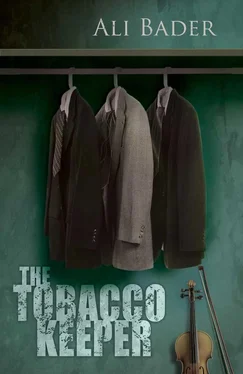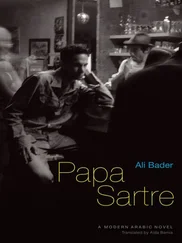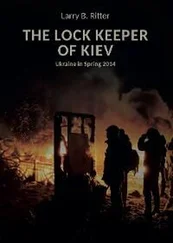What was truly astonishing, at least from my perspective, was that they all had Western names: Michael, John, Robert or Sam. They were never called by their Arab names. When I asked Nermine about this, she said the Americans had trouble pronouncing Arab names such as Abdel Rahman, Majeed, Rebhi and Fakhri. So they used those fake names instead, which were easy and accessible and created no psychological barriers. Iraqi names in general suggested a kind of tacit enmity, while Western names, on the other hand, allowed Iraqi translators to forget the realities of their situation and live the illusion that they were truly American. This led them to act arrogantly, as though they’d appropriated the white masks of the Americans for themselves. This was what French philosopher Frantz Fanon meant by black skin and white masks. According to him, colonialism, in effect, oppresses and crushes people, hollowing them out and filling the void with a fragmented image of their original personality. In other words, the character of the keeper of flocks in Tobacco Shop is replaced by the character of the protected man, with a new name that is always American. It’s a dreamed-of character but one that cannot be fulfilled due to the oppressive, humiliating presence of the Americans. It is a character that is not ‘protected’. The first character, the keeper of flocks, is spurned and discarded like rubbish. As with colonialism, a bitter conflict arises between Alberto Caeiro and Ricardo Reis, which renders the presence of de Campos, the tobacco keeper, almost impossible.
V Boris, Samir and Farida Reuben’s letters
The office of the Press Cooperation Agency and AC Media & News was located in a quiet area full of small stone buildings and thick trees that gave it the feel of an old aristocratic neighbourhood. At the bend of Street No. 7 stood the building that housed the agency and other press organizations.
The entrance led us to a winding staircase that connected three floors. We reached a small white door on which was elegantly written ‘AC Media & News’. It was an international press agency that maintained a neutral stance regarding the events in Iraq. It was also engaged in helping Iraqis overcome the effects of occupation, and tried to ease sectarian tensions and contribute to the development of an independent Iraqi identity. At its helm was a man known as Little Boris, a veteran reporter of Russian origins. He was a hefty guy with a bald head who looked like Khrushchev. The man in charge of Iraqi affairs was Samir Mohammad, a German journalist of Iraqi descent who spoke no Arabic at all.
Samir was a fascinating personality. I’d seen his photograph for the first time on the cover of an American or French magazine; I don’t remember which. I was surprised because he didn’t look like any of the Iraqis I knew either inside or outside Iraq. With his healthy, ruddy complexion, his pale golden hair and his green eyes, it was difficult to associate him with the Middle East in any way. When I’d visited him for the first time in his office the previous winter, he’d been very friendly. We’d sat for over an hour, drinking tea and talking about various things. The meeting had been very genial and there’d been a low flame in the fireplace nearby. The chairs had had white satin coverings over their arms, and the table had been covered with black leather. Samir had sat directly opposite me. Beside him had sat a very beautiful woman who was quite plainly dressed. What she’d said was slightly strange and she’d spoken very quietly. I understood that she was a translator and had started translating an Iraqi novel into English.
During our short meeting this translator had asked me a few questions about translations of Iraqi literature into French. Although we hadn’t talked for long, my first meeting with Samir being very brief, it had all been quite friendly. I’d come to see him at his request, as I’d written a long report on the problems facing the fishermen in the Gulf of Basra after 2003. This report was later turned into a piece for a French TV channel. I later forgot almost all about it, because the issues of fishermen, shoemakers and street vendors seemed trivial in comparison with kidnappings, assassinations, oil-smuggling operations and the militias’ control over the port of Basra. Nevertheless, I’d received a message asking me for a meeting. During the meeting, Samir had wanted to commission me to write a report on the situation of Iraqi women in Basra. This had been triggered by the murders and kidnappings they were subjected to practically every day. He’d given me many documents dealing with the numerous kidnapping gangs and the groups that specialized in killing women. There were photographs of graffiti that warned, and threatened to kill, women who did not adopt Islamic dress or the veil.
This was the second time I’d met Samir in his office. He recognized me immediately and said we’d met twice before. I was quite surprised because I remembered only the one occasion, those few months earlier in his office.
As he shook hands with me, he murmured a few compliments that didn’t mean anything to me. He led us through the door to the agency. He walked quickly in front, while Faris Hassan and I trailed behind. Before inviting us to sit in his office, we stopped briefly at Faris’s office. It was only then that I learned that Faris had his own office at the agency, which meant that he was officially an employee.
Samir immediately addressed the issue at hand. He was very practical and not given to small talk. One of his obvious traits was never looking directly at you or into your eyes. He spoke with his eyes directed elsewhere and his hands moving quickly. He jumped around the office from one spot to another, which made us struggle to keep up with him. He led us first to a small room near the kitchen from which a Sri Lankan worker emerged carrying glasses of tea. From there he went straight to his own office and invited us in.
He took some books off the shelf and placed them on the long table that was littered with papers, newspapers, magazines, teacups and pens as well as a laptop and other miscellaneous objects. He spoke while shuffling envelopes and packages around as if looking for something, and talking all the while.
I felt greatly relieved on entering his office. For some unknown reason, I was happy. The sun’s rays were streaming through the open window and the beautiful sunny atmosphere contrasted sharply with my first visit back in the winter. The blinds had been drawn at that time and the outer window, in the shape of a concertina, had been closed. The room had been cold and damp in spite of the fireplace with its flickering blue flame. Today, however, spring was in full bloom and the windows were wide open, allowing the sun’s rays to filter gently into the room. The soft cool breeze blew gently and intermittently. From where we stood near the large table, the view was stunningly beautiful. There was a green open space dotted with red and yellow flowers, and rows of lush green trees whose huge trunks rose high into the air. As we stood in the office, we could see the winding street teeming with cars and pedestrians. Shops were open, indicating the vitality and vibrancy of the city. It was a very different impression from what we’d seen as we drove in from the airport.
Samir didn’t invite us to sit down, as if wanting us to enjoy the lovely view of the green landscape and the river in the background. He continued searching for various things that were scattered on the shelves. I had no idea what he was looking for or what he wanted to show me. Since our meeting the previous winter I’d learned to listen to his non-stop talk. He was chatting in a very animated way, as he had the first time when he’d urged me to visit Basra to write the piece on the situation of women in the south. This time, however, he urged me to travel to Tehran and Damascus to complete the report. For my part, I was all ears. He explained fairly precisely the importance of this investigation for the current situation in Iraq. He commented in detail on the stages of Kamal Medhat’s life, for he knew much more about him than I did, down to the smallest details, as though he’d decided that I should know everything in advance.
Читать дальше












